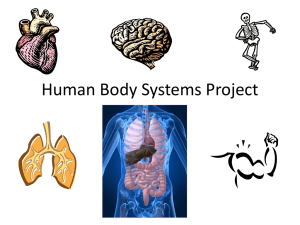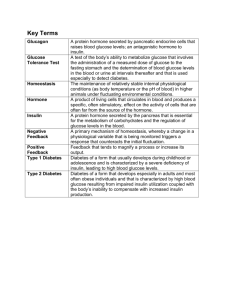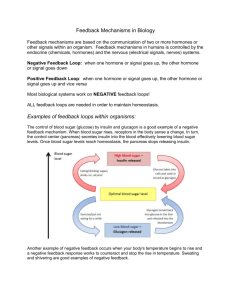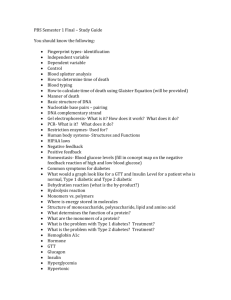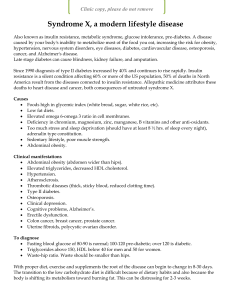Activity 4 Answer Key
advertisement
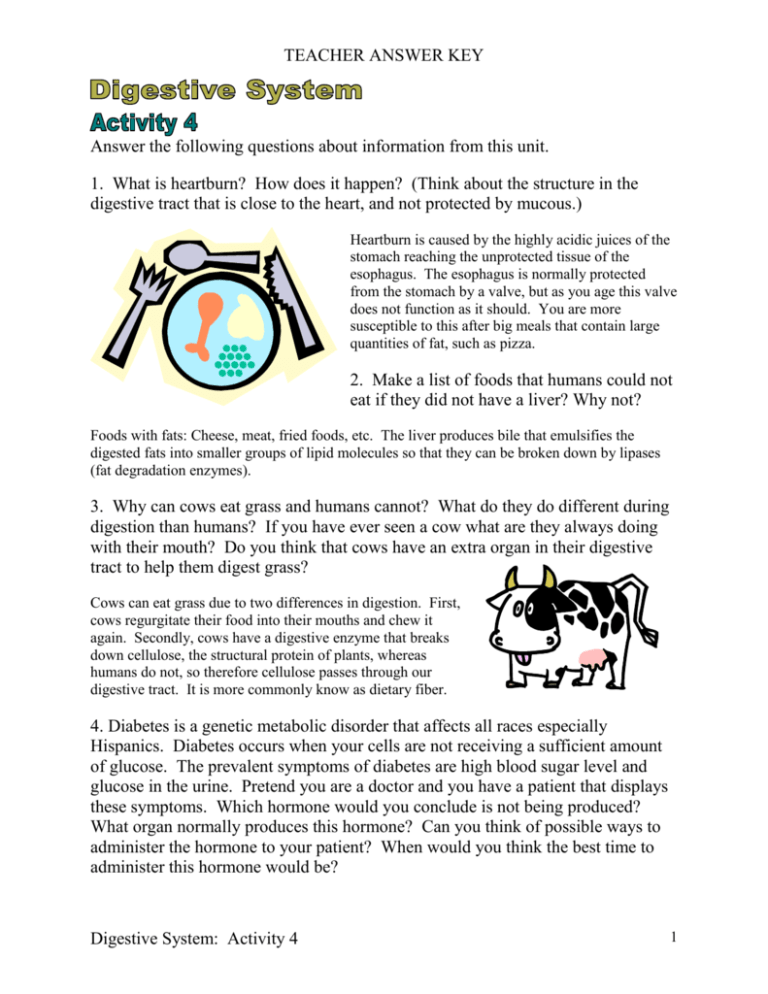
TEACHER ANSWER KEY Answer the following questions about information from this unit. 1. What is heartburn? How does it happen? (Think about the structure in the digestive tract that is close to the heart, and not protected by mucous.) Heartburn is caused by the highly acidic juices of the stomach reaching the unprotected tissue of the esophagus. The esophagus is normally protected from the stomach by a valve, but as you age this valve does not function as it should. You are more susceptible to this after big meals that contain large quantities of fat, such as pizza. 2. Make a list of foods that humans could not eat if they did not have a liver? Why not? Foods with fats: Cheese, meat, fried foods, etc. The liver produces bile that emulsifies the digested fats into smaller groups of lipid molecules so that they can be broken down by lipases (fat degradation enzymes). 3. Why can cows eat grass and humans cannot? What do they do different during digestion than humans? If you have ever seen a cow what are they always doing with their mouth? Do you think that cows have an extra organ in their digestive tract to help them digest grass? Cows can eat grass due to two differences in digestion. First, cows regurgitate their food into their mouths and chew it again. Secondly, cows have a digestive enzyme that breaks down cellulose, the structural protein of plants, whereas humans do not, so therefore cellulose passes through our digestive tract. It is more commonly know as dietary fiber. 4. Diabetes is a genetic metabolic disorder that affects all races especially Hispanics. Diabetes occurs when your cells are not receiving a sufficient amount of glucose. The prevalent symptoms of diabetes are high blood sugar level and glucose in the urine. Pretend you are a doctor and you have a patient that displays these symptoms. Which hormone would you conclude is not being produced? What organ normally produces this hormone? Can you think of possible ways to administer the hormone to your patient? When would you think the best time to administer this hormone would be? Digestive System: Activity 4 1 TEACHER ANSWER KEY The pancreas does not produce insulin. Insulin can only be administered by a shot. There are diabetes pills but they only reduce the effects of the symptoms, they are not an alternative to the insulin shot. If insulin were administered as a pill, it would be denatured in the highly acidic juices of the stomach. Insulin is needed the most after you have eaten a meal. It must be administered 3 - 4 times daily. 5. Apply your knowledge and speculate on a general mechanism in the body that could stimulate the contraction of the diaphragm and the abdominal muscles that stimulate vomiting. Begin with a trigger/receptor listed in the “What We Know” section and finish with the muscles that are stimulated. Your mechanism should list the steps a signal would take to get from the trigger/receptor to the muscles that make you vomit. You should incorporate your knowledge from other organ systems mainly the nervous system. A general hypothesis for this question should include the following: 1.) One of the receptors (Listed in the what we know section on digestion) is triggered and it signals an adjacent nerve. 2.) The triggered nerve relays the message to the central nervous system. 3.) The message is interpreted by the CNS. 4.) The CNS initiates a signal that is destined for the appropriate body parts to complete the task. 5.) The message travels down a different nerve to the diaphragm and the abdominal muscles causing them to contract. Digestive System: Activity 4 2

